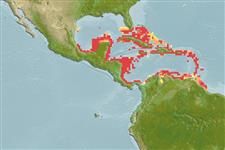Preferred temperature (Ref.
115969): 20.4 - 28.4, mean 27 (based on 1501 cells).
Phylogenetic diversity index (Ref.
82804): PD
50 = 0.5007 [Uniqueness, from 0.5 = low to 2.0 = high].
Bayesian length-weight: a=0.01288 (0.00909 - 0.01825), b=3.00 (2.91 - 3.09), in cm Total Length, based on LWR estimates for this species (Ref.
93245).
ระดับชั้นอาหาร (Ref.
69278): 3.7 ±0.3 se; based on diet studies.
ความสามารถในการกลับคืนสู่ปกติ (Ref.
120179): ต่ำ, เวลาต่ำสุดที่จะทำให้ประชากรเพิ่มขึ้นเป็น 2 เท่าใช้เวลา 4.5 - 14 ปี (K=0.3; tm=2; tmax=20).
Fishing Vulnerability (Ref.
59153): Moderate vulnerability (40 of 100).
Climate Vulnerability (Ref.
125649): High to very high vulnerability (66 of 100).
